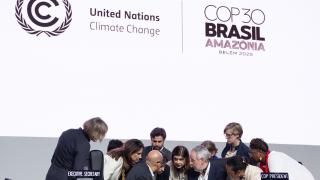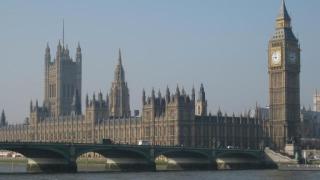As the UK and key allies prepare to recognise the State of Palestine at the UN, the Israeli government is accelerating moves on the ground that aim to make Palestinian statehood impossible, and to force Palestinians from their land. Opposed by most countries in the world, and despite growing internal opposition, the Netanyahu government is bombarding, occupying and demolishing Gaza City; closing in on the 25% of Gaza not already occupied by Israeli troops; and starving the Palestinian population. This is in obvious defiance both of international humanitarian law and of the provisional measures ordered by the International Court of Justice in January 2024 to prevent genocide.
The latest Integrated Food Security Phase Classification (IPC) analysis has determined that Gaza is in famine, and that this is “entirely man-made”. Israel has killed large numbers of Palestinian journalists and is excluding international journalists from Gaza, but eyewitness testimony abounds from Palestinian sources and international humanitarian workers. The world’s leading association of genocide scholars has declared that Israel’s actions in Gaza constitute genocide.
The IPC report states that:
As this Famine is entirely man-made, it can be halted and reversed. The time for debate and hesitation has passed, starvation is present and is rapidly spreading.
In the West Bank, meanwhile, escalating settler violence is met with impunity, and Israel is activating plans to build a giant settlement that would split the West Bank in two. The Israeli Finance Minister, Bezalel Smotrich, has said that the settlement would “bury” the idea of a Palestinian state. Most Palestinians in Gaza have already been forcibly displaced from their homes, which have been destroyed, while Israel is floating ideas of deporting them to fragile or conflict-affected countries in Africa. There are reports of US and Israeli companies advising the White House on how the Western private sector could profit from the land taken from Palestinians.
Credible legal and diplomatic routes are available to end the violence and rebuild security for both Israelis and Palestinians. A ceasefire in January was broken by Israel. Since then, Hamas, which continues to hold Israeli hostages in violation of international law, has accepted a ceasefire plan put forward by the US; that plan is more favourable to the terms Israel itself had proposed just a few weeks ago, and which would see the hostages released along with Palestinians detained (often without trial) by Israel. Alongside, and reinforcing, the plans for more countries to recognise the State of Palestine, a large and diverse international coalition of countries, spearheaded by France and Saudi Arabia, have worked on a plan to resurrect the two-state solution and bring peace and security to Palestinians and Israelis alike. This includes a transitional government for Gaza, a reconstruction and recovery fund, and the outlines of a UN-mandated international stabilisation force, as set out in the New York Declaration of the UN High-Level International Conference for the Peaceful Settlement of the Question of Palestine, held in July. The UK is co-chairing (with Egypt) a working group on humanitarian action and reconstruction.
But there are indications that Israeli leaders hope that the US administration will accept or legitimise open annexation and mass expulsion. The implications go far beyond Gaza, forming part of a wider, global threat to international law, peace and security: with Russia refusing to leave Ukraine, and questions about US commitment to upholding international law, there is a dangerous resurgence of expansionist ambitions in multiple quarters with the potential to fuel yet more wars. This makes it all the more important to protect international humanitarian law and restrain the worst excesses of war.
For its part, the UK Government has not yet made it clear to the government of Israel that its current actions are fundamentally incompatible with having a normal diplomatic relationship with Britain, let alone being an economic or security partner. Steps have been taken to limit arms supplies and to sanction people directly associated with settler violence. The Scottish government has declared it will no longer award public money to companies exporting arms to Israel. But Westminster has so far balked at economic sanctions, even when it comes to products produced in illegal settlements in the West Bank, while Israeli arms companies will be exhibiting at the UK’s biggest arms fair in September.
Moreover, press reports suggest that the Ministry of Defence is considering engaging the UK subsidiary of an Israeli arms company which manufactures many of the weapons used in Gaza, Elbit Systems, to train the British army for years to come. If so, this would tie the UK into ongoing cooperation with Israel, despite the clear indications that Israel is considering the annexation of most of the West Bank, which would in practice either mean an apartheid state, mass expulsions, or some combination of the two. It would raise stark questions about Britain’s own future role in the world if the Israeli defence industry is put forward as a model in the context of growing evidence of genocide.
UNA-UK Chief Executive Jane Kinninmont said:
There may be arguments made that without US pressure, the UK cannot change Israel’s direction of travel. But if Israel is deemed likely to continue down this path, then surely Britain has all the more reason to ensure it is not locked into long-term defence or trade partnerships with a country committing war crimes and in multiple violations of international law.
Instead, Britain, coordinating where possible with other allies, should utilise a wider set of measures to indicate that the current Israeli government’s actions are unacceptable, in parallel to its efforts to set out positive alternative options. Building on measures being taken by a number of other countries and on sanctions used in other cases of violations of international law, such measures should include economic sanctions, including but not limited to a ban on products from illegal settlements, as well as targeted sanctions on Israeli officials linked to war crimes, reviews to visa arrangements and research cooperation, and work on accountability and justice, including proactive support for the ICC’s investigations into war crimes.
Read more:
- Over 50 British former diplomats and UN officials urge UK to recognise Palestinian state in an open letter to the Prime Minister
- The Elders’ open letter to the leaders of Canada, France and the United Kingdom urging them to fulfil their stated commitment to recognise the State of Palestine without condition or delay.
- Open letter from ex-EU Ambassadors calling for action to end Israel’s atrocities






